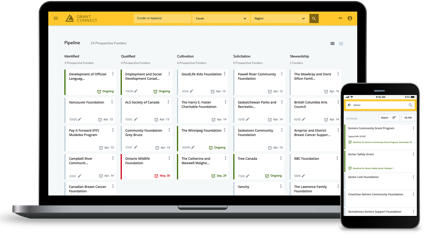This article was originally posted on May 29, 2014. Last updated on April 29, 2021.
Deciding how much to ask for in a grant application can be a perilous job. Do you swing for the fences and ask for $100,000 at the risk of making your nonprofit seem unreasonable to the application reviewer? Or do you simply try to get on base and ask for $5,000? Like so much in fundraising, the right answer does depend on the context. That being said, here are some helpful tips to keep in mind.
1. Look at guidelines before all else
Although this tip may seem obvious, not paying attention to the guidelines and preferences of the funder is one of the most common grantwriting mistakes. Many have very specific guidelines as to the size of gifts they are willing to make. For example, the Vancouver Foundation Systems Change Grants program has three grant types - one of which allows requests up to $20,000, whereas the other two types allow requests up to $100,000.
In other instances, a funder might specify the maximum size of grants they are willing to give. Other funders indicate the percentage of a project’s cost they will support. RBC Foundation guidelines state that they will fund up to 50% of a specific project or program budget, and no more than 20% of the organization's operating budget.
2. Identify patterns in past giving
Often funders don’t have published giving guidelines so the next place many look is their giving history, which can reveal trends in the size of their past grants. Subscribers to prospect research databases like Grant Connect have access to a table of interactive gift history for every funder.
This tip comes with a big caveat. If a funder has given a grant of $100,000 to the University of Toronto, don’t assume that you will have a good chance of securing the same amount if you are a volunteer-run social service agency. Instead, look for organizations that are comparable to your own. Identify examples of donations that went to nonprofits in a similar field to yours, a similar geographic location, and who have a similar capacity. This will give you a more grounded view of what you could ask for.
What happens if the giving history doesn’t align with their guidelines? Always follow the guidelines if they exist, not the giving history, when you determine your ask. The giving history of a funder could be based on historical relationships with their grant recipients or on past strategy. For example, a funder may have previously supported a smaller number of organizations with bigger donations and now supports a wider number of causes with smaller amounts.
3. Consider your track record
The amount of the ask should depend on the established reputation, track record, and capacity of your organization. Why? Consider the donation you are asking for as an investment. If you are successful, the funder is providing you an investment of funds that will generate a positive return to the community. Like any financial investment, some are more risky than others. If yours is a well-known organization with a long track record of successful program delivery and sound financial practices, funders will likely be more comfortable providing mid-to-larger sized grants, than it would to a brand new organization (all else being equal).
4. Frame it around the entire grant budget
As we mentioned in our first tip, many funders have stated restrictions on the percentages of a project that they are willing to fund. But if this restriction isn’t listed, it doesn’t mean you shouldn’t worry about it. Typically, funders prefer to fund projects that have multiple sources of revenue. If the total budget for your project is $45,000 and a funder is offering grants up to $100,000, avoid asking for the full $45,000. Instead, try to solicit this amount from a few different sources. To learn more about writing a strong grant budget, check out these six tips.




